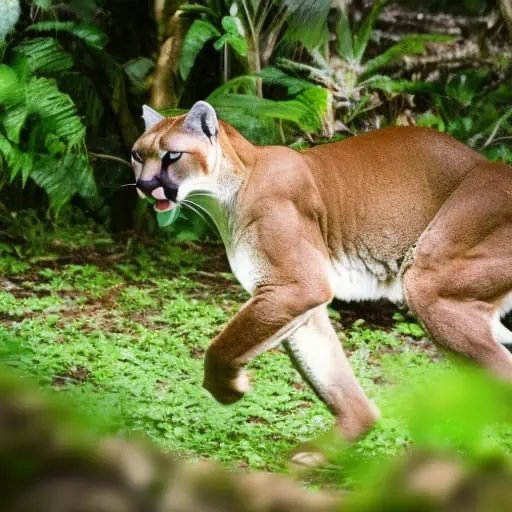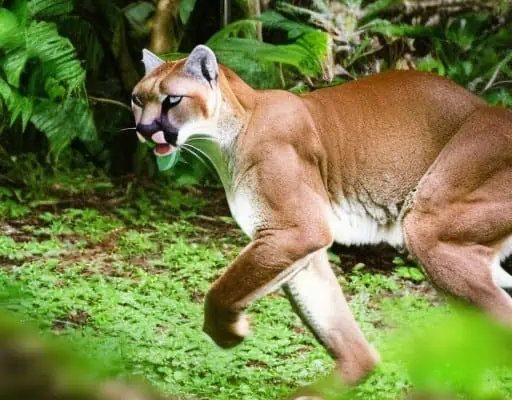
Honestly, these majestic creatures are often seen as guardians, healers, or even tricksters in different cultures. Just like a remote control can serve various functions—like pausing a movie or flipping channels—cougars serve multiple symbolic purposes in the folklore and stories of many communities. So, let’s dive in and explore how cougars are depicted in various cultures and what these representations tell us about human relationship with nature.
Cougars in Native American Culture
Cougars hold a special place in Native American mythology. Many tribes see the cougar as a powerful spirit animal, representing strength, courage, and leadership. For instance, the Lakota people view the cougar as a symbol of protection. They believe that this feline watches over their people, guiding them through challenges.
In other tribes, like the Shoshone, the cougar is seen as both a hunter and a teacher. Stories often tell of cougars teaching lessons about bravery, resourcefulness, and the balance of nature. These narratives highlight a deep respect for the animal, illustrating the cougar not just as a predator but as a vital part of the ecosystem—a reminder to honor all living things.
You might wonder how these stories are passed down. Traditionally, they’re shared orally, from elders to younger generations. By telling these tales, communities forge a connection with the cougar, ensuring that its significance remains alive.
Cougar Symbolism in Modern Media
Now, let’s shift our focus to the modern world. In films, books, and even branding, cougars are often depicted as fierce and independent. Consider characters like Cheetara from “Thundercats” or the many portrayals of female cougars in movies—these representations often highlight agility and strength.
Here’s the thing: while many portrayals emphasize the cougar’s fierceness, they also underline a sense of mystery and allure. Cougars are frequently used as metaphors for female empowerment, reflecting traits like confidence and self-assuredness. It’s fascinating how a single animal can embody so much depth and complexity, serving as a mirror to society’s evolving views on gender and power dynamics.
But it’s not all positive; some representations lean towards the dangerous aspect. Cougars can also symbolize lurking threats in urban settings, reminding us of the wildness that exists just beyond our civilization’s reach. This duality can create a compelling dialogue about our relationship with nature and the instincts that come with it.
Cougars in Folklore and Legends Around the World
The cougar’s global presence highlights how various cultures interpret this magnificent animal differently. In South America, for example, the Incan civilization revered the puma, considering it a protector of the earth. They believed that the puma’s spirit resided in the mountains, safeguarding their lands.
In contrast, Australian Aboriginal cultures often compare cougars to other powerful animals, using them in stories that teach about survival and balance. These legends often emphasize the connection between humans and nature. This relationship signifies how important it is to respect the animal kingdom and learn from its ways.
It’s interesting to see how these stories vary yet share common themes. Whether it’s strength, protection, or a lesson learned, cougars appear in tales that help us navigate life’s complexities. Each culture adds its own flavor, making the cougar a universal symbol that transcends borders.
The Cougar in Art and Literature
Moving to the realm of art and literature, cougars appear in various forms, from paintings to poetry. Artists often portray them with a sense of grace and power. Think of the countless illustrations of cougars crouching in the shadows or leaping through the air—these images evoke both beauty and danger.
In literature, cougars are featured as characters that embody resilience or freedom. For instance, in William Faulkner’s short stories, they symbolize both the untamed spirit of the wilderness and the struggle for survival. Through these artistic representations, we continue to explore the complexities of cougars within our own lives.
Isn’t it fascinating how an animal can inspire creativity? Artists and writers use cougars to express emotions, explore cultural themes, and even challenge societal norms. They remind us of the wildness within us all, encouraging readers and viewers to find their strength.
Cougar Symbolism in Spiritual Practices
When it comes to spirituality, the cougar is often seen as a spiritual guide. Many cultures view the animal as a symbol of inner strength and resilience, connecting it to personal growth and self-discovery. Some spiritual traditions use cougars in meditation practices, encouraging individuals to tap into their instinctual wisdom and courage.
In shamanic practices, cougars are frequently invoked as spirit animals. They’re believed to guide individuals on their journeys of transformation. During rituals, participants might call upon the cougar’s energy for protection or guidance, helping them navigate through life’s challenges.
The cougar’s powerful presence in these spiritual contexts emphasizes the importance of listening to our instincts. In a world that often pushes us towards conformity, embracing the cougar’s symbolism can inspire us to stand tall and trust our unique paths.
The Cougar’s Role in Environmental Conservation
In today’s world, cougars have become symbols of conservation efforts. As apex predators, they play a vital role in maintaining the balance of ecosystems. Many conservation organizations use the cougar to highlight the importance of protecting wildlife habitats.
The cougar serves as a reminder of our responsibility to the natural world. Their presence in a region often indicates a thriving ecosystem, showcasing the interconnectedness of life. When we honor the cougar, we also advocate for the preservation of its home and other wildlife.
Several campaigns use the cougar as a mascot for environmental awareness. By bringing attention to the challenges these magnificent animals face—like habitat loss and poaching—we can foster a greater appreciation for all wildlife. Protecting cougars helps us protect the entire ecosystem, a win-win situation.
The representation of cougars in culture and folklore reveals a deep, multifaceted relationship between humans and nature. From their powerful symbolism in Native American stories to their fierce portrayals in modern media, cougars help us explore themes of strength, protection, and the balance of life.
As we continue to share stories about cougars, we not only celebrate their beauty but also reflect on our connection to the natural world. Whether through art, literature, or spiritual practices, the cougar remains a vital symbol—reminding us to respect and cherish the wilderness. So next time you think of a cougar, remember that there’s a whole world of stories waiting to be discovered, each adding richness to our understanding of these magnificent creatures.

